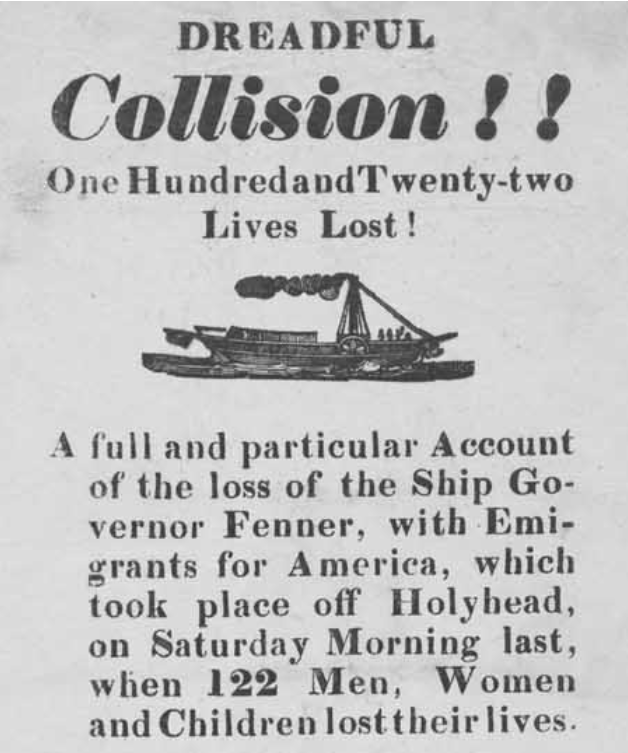1 note
1 note
[Note 231.1]

An engraved glass tumbler commemorating the loss of the The Govenor Fenner. The body is engraved with a scene showing the collision with 'The Nottingham', and dated 1845

The following report, copied from the Edinburgh Observer of 23rd February 1841 was published as a broadside in Scotland [Ref: National Library of Scotland L.C.Fol.74(355)]. It reads in full
DREADFUL Collision ! !One Hundred and Twenty-two Lives Lost! A full and particular Account of the loss of the Ship Governor Fenner, with Emigrants for America, which took place off Holyhead, on Saturday Morning last, when 122 Men, Women and Children lost their lives. I t is our painful task to have to record one of the most melancholy disasters which, of late years, has taken place in the channel, and which has been accompanied by the loss of not less than one hundred and twenty-two men, women and children. The American ship Governor Fenner, Captain Andrews, which sailed hence on Friday, at noon, for New York, came in contact, on the following morning, at two o'clock, off Holyhead, with the Nottingham, steamer, from Dublin to this port. The ship struck the steamer amidships. So great was the force of the collision, that the ship's bows were stove in, and, in a few minutes from the time of the vessels coming in contact, she sank, the captain and the mate being the only persons, out of 124 souls on board, who saved their lives. The Nottingham was dreadfully shattered, but, having been struck in her strongest part, the collision was not fatal to her. The passengers were all below in their berths when the collision between the ship and the steamer took place. The shock caused by it would, of course, rouse even those who might have been asleep. No doubt they would make a rush towards the deck : the interval, however, which elapsed between the shock and the sinking was so short, scarcely five minutes, that very few, if any could have succeeded in reaching it; so that, in all probability, most of them perished in their berths. The mate, we understand, had been married a few days only before the ship's sailing on her voyage: the captain had given her a berth with her husband in the cabin. When the fate of the ship became inevitable, he attempted to run aft to rescue his wife. Time failed him-the instinct of self-preservation became strong-he sprang up the shrouds, and reached the steamer, as we have already stated, by jumping from the foreyard-arm. The Nottingham, which now lies on the east side of the Clarence Dock, was yesterday visited by thousands of curious spectators. Her starboard side is a complete wreck ; even the houses on the deck adjoining are shivered to fragments. The dead animals, cows and sheep, covered the deck, and presented a shocking sight, most of them having been disembowelled by the concussion which caused their death.

Restored figurehead of the Governor Fenner (Institute of Welsh Maritime Historical Studies)